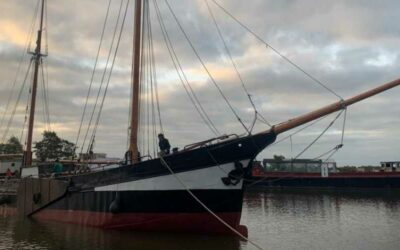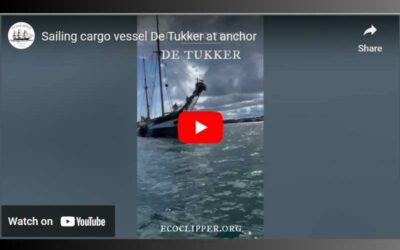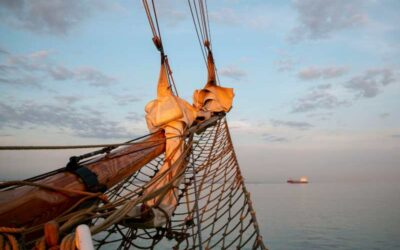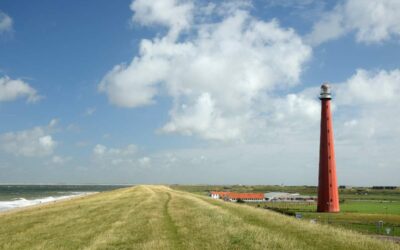The sailing vessel is a proven technology to transport goods and people over long distances. You can become part of its resurrection.
While the holiday season is in full swing and at the Talsma shipyard heavy steelwork has quieted down a bit, it is a good moment to overthink the why of sail cargo. As I write this in an empty shipyard cantina, our refit crew is getting ready to add another layer of paint to the recently added galley house” on “De Tukker”. Outside the sun is scorching the pavement. I know somewhere on the coast of France, my good friend: Capt. Andreas Lackner is in command of the true clipper brigantine “Tres Hombres”, to ship a cargo of wine to Denmark. Even further away, and all around the world, other partners, companies and associations are working on a comeback of the wind powered ship. It is just a matter of when: the great transition to wind propulsion will happen. This is a trend which will not go away anymore, and this is why…

By: Capt. Jorne Langelaan, CEO at EcoClipper
1. Using wind for transport saves the climate.
According to the International Maritime Organisation, shipping is responsible for emitting more than 1.000 million tonnes of CO2 annually (source: Fourth IMO Greenhouse Gas Study). By shipping way less, and shipping what is absolutely required by emission-free sailing vessels, these emissions could be reduced almost entirely.
2. Wind is a renewable energy and thus can be used forever.
Fossil fuels: mainly oil and gas, are currently used for propelling the transport sector. These fuels have been formed by compressing plankton and plants for millions of years underground. Since the industrial revolution, about half of these reserves have been used, and now the industry is starting to get to the not so easily subtractable latter half. Even the International Energy Agency is stating that society should get ready for using less oil (source: IEA Press release March 2022). Sailing ships do not need fuel for propulsion and thus are independent of this development.
3. The Energy Return of Investment (EROI) of fossil fuel is dwindling.
Every subtracted unit of energy comes with a cost. Originally when oil, gas and coal started to be contracted their returns of investment numbers were quite profitable. However with more of the easily won resources becoming depleted, less easily subtractable resources, scale oil, deepwater and arctic wells are being mined (source: report University of Leeds). At the same time the EROI of renewable energy, due to constant innovations, is becoming more positive. At a, not so far away, point in the future the EROI of wind propulsion will overtake the EROI of mechanical propulsion.
4. Wind transport gives the true ecological price of shipping.
With the huge economies of scale, containerization and the abundance of cheap subsidised fossil fuels, conventional sea transport has become almost free for its customers. Of course this does not take into consideration the real price of shipping. This is paid by health issues of the inhabitants of ports and coastal regions, and mariners. It is paid by the effects of climate change, overconsumption and plastic waste. Whereas with the use of sailing ships, the direct costs for the shipper might be higher, but it eliminates all secondary costs for the environment (source: The business case for true pricing).5.
5. Shipping by sailing vessel keeps overconsumption in check.
Because shippers will pay the true price for transport in sailing vessels, only valuable goods are still worthy of shipping over long distances. This eliminates the endless transport of cheap consumer goods and establishes a market for local production of cheaper bulk products. That way stopping the global effect of producing only in the countries with the lowest possible wages, and the least possible environmental legislation (source: The Local Impact of Containerization).




